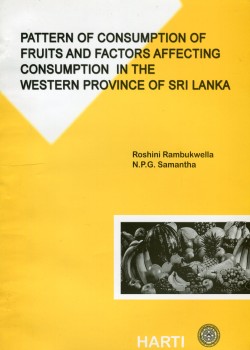
Pattern of Consumption of Fruits and Factors Affecting Consumption in the Western Province of Sri Lanka
Author : Rambukwella, R. and Samantha, N.P.G.
Publisher: Hector Kobbekaduwa Agrarian Research and Training Institute(HARTI)
Place of Publish: SriLanka, Colombo
Year: 2013
Page Numbers: 75
Series: Research Report No: 159’ September 2013
Acc. No: 4546
Class No: 338.1 RAM-SL
Category: Books & Reports
Subjects: Agriculture
Type of Resource: Monograph
Languages: English
ISBN: 978-955-612-158-2
Fruit is an important component in the food structure and consumption of fruit contributes to an increase of one's nutrient level. Low fruit consumption is an important modifiable risk factor that contributes to the rising global level of chronic diseases. The major objective of this study is to identify the factors influencing low consumption of fruit. To identify the existing consumption pattern and buying behavior of fruits among the different income group of households in the Western Province of Sri Lanka and to probe the consumer awareness of the health benefits fruit consumption are the other objectives of this study. Three districts viz. Colombo, Gampaha and Kalutara were selected for this study. According to the findings, inadequate fruit consumption was common in all the income categories. Non availability of fresh and tasty fruit due to using chemicals to ripen them, high price, and seasonality were identified as the major significant factor responsible for low consumption of fresh fruit. The study also revealed that monthly consumption of fresh fruit was highly dependent on family income and number of family members. The study also revealed that, consumers were more concerned about the way of ripening fruit. They were reluctant to buy fruit due to poor ripening methods and majority of them reported that the fruits which were not naturally ripened, had no real taste. They also thought it was harmful for their health, specially their children's health. The study recommends that existing Government policies and rules that support the fruit availability, affordability and accessibility need to be improved. It is urgent to educate parents on food and nutrition regarding children's dietary intake of fruits at home.



